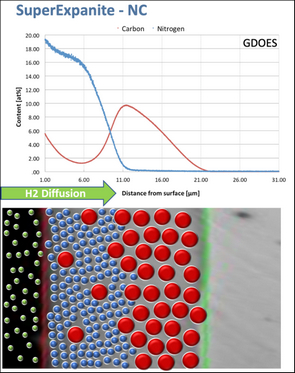Hydrogen – whether applied in shipping, steel production, refineries or power-to-x application – it has become the energy source of the future, yet already used in many sectors. Due to its special properties, the hydrogen gas poses several technical challenges for the respective components with which it comes into contact, so that the use of corrosion-resistant stainless steel is essential. This in turn is susceptible to wear and galling and this is exactly where the technology of the Danish pioneer for surface hardening of stainless steel and titanium comes into play.
Hydrogen - the element that comes first in the periodic table and is therefore the smallest and lightest atom among all elements - has been traded for some time as the greatest hope for future energy supply. With a mass fraction of about 70%, hydrogen is the most common chemical element in the universe. On Earth, however, its mass fraction is only 0.87% and is largely bound in water.
Starting with production, over to transport ending with the actual usage, wherever hydrogen is involved, stainless steel components are also used, some of which are subject to extreme wear depending on the application and naturally subject to galling. In the past, this problem was countered with traditional wear protection methods and the respective components were protected with a coating (e.g. hard chrome plating, DLC or chrome carbide) or classic plasma nitriding or salt bath diffusion layers. However, these processes are generally known to affect the corrosion resistance of the stainless steel parts negatively.
The solution to this dilemma - a surface hardening that protects against wear and galling while at the same time maintains or even improves the corrosion resistance of the materials - was developed by the founders of the Danish company Expanite and is increasingly being used in the hydrogen sector. For example, components of high pressure and control valves or clutch systems used in the hydrogen infrastructure up to components for fuel cells are hardened.
 Sustainably prevent hydrogen embrittlement
Sustainably prevent hydrogen embrittlement
"Our customers often ask whether the Expanite technology increases the risk of hydrogen embrittlement, which is not the case," explains Dr. Holger Selg, application expert and Expanite Sales Director DACH, who going further into detail: "The cause of the hydrogen embrittlement can be traced back to the diffusion of the hydrogen into the material, and in theory the Expanite layer acts as a diffusion brake to a certain extent. Charged with nitrogen and carbon, the Expanite surface is harder for the hydrogen to penetrate than an untreated surface."
he gas-based diffusion process from Expanite is significantly more energy-efficient and environmentally friendly than comparable wear protection processes, and thanks to the treatment in a vacuum, no time-consuming cleaning of the parts, e.g. with aggressive chemicals, is necessary after hardening
he Expanite technology, specially developed for corrosion-resistant materials, offers a solution for austenitic, martensitic, ferritic and duplex stainless steels as well as for expensive nickel-based alloys such as Inconel and Hastelloy. The new special process ExpaniteHard-Ti, which the Expanite team of experts in Denmark has developed to market maturity in recent years, is used for titanium materials.
About Expanite:
Expanite was founded in 2010 by leading experts in material and surface hardening whose research dates back to 2000. The company is headquartered in Hillerød near Copenhagen and has treatment centers in the USA, Germany, Korea and China. Expanite's solutions are flexible and can be tailored to the customer's own product line within the framework of a license agreement.
